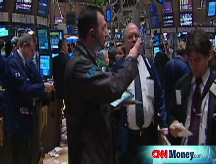AmEx: 24% profit drop, better than forecasts
Credit card giant reported 24% decrease in profits but results top forecasts; company boosts reserves for bad loans and hints at weak economy into 2009.
NEW YORK (CNNMoney.com) -- American Express reported a 24% decline in earnings for the third quarter Monday. But the results were better than expected, sending shares of the credit card giant significantly higher after hours.
The company said it earned $815 million in the third quarter, or 70 cents per share. A year ago, the company reported a profit of $1.07 billion.
American Express reported a profit from continuing operations of 74 cents a share, much higher than the 59 cents per share profit analysts polled by Thomson Reuters predicted that the company would report on this basis.
American Express reported revenue of $7.16 billion in the third quarter, up by 3% from $6.96 billion in the same quarter last year, but slightly lower than forecasts of $7.31 billion.
The company also said that it expected the global economy to continue to weaken well into 2009 and it hinted at layoffs.
The third-quarter report came on the heels of a sour second-quarter report. Profits sunk 38% in that quarter and American Express (AXP, Fortune 500) warned that deteriorating economic conditions would hurt the company.
Write-offs of bad loans continued to increase in the third-quarter, and the company said it set aside "significant additions" to cover loan losses.
Overall, the company said its loan provisions were $1.4 billion, up 51% from the same period last year. American Express set aside $941 million to cover losses in its U.S. card segment, up from $638 million a year ago.
The loan write-off rate for U.S. credit cards was 5.9% in the third quarter, up from 5.3% in the second quarter and significantly higher than 3% one year ago. And the company's profits from U.S. credit cards fell nearly 59% to $244 million.
With credit card holders struggling to make payments on time, American Express chairman and CEO Kenneth Chenault said in a statement that the company will be more selective in who it will lend money to in the future.
"We saw clear signs earlier this year of a weakening environment and the recent volatility in the financial markets has reinforced our view that consumer and business sentiment is likely to deteriorate further," said Chenault in a statement.
Still, shares surged more than 6% after hours. The stock rose more than 4% in regular trading Monday.
American Express, like other financial stocks, has been hit hard this year. Shares have lost more than half their value so far in 2008.
During a conference call following the earnings release, CEO Chenault and Dan Henry, executive vice president and acting chief financial officer, both acknowledged that the company has suffered as bank-to-bank lending rates - also known as Libor rates - have made it more expensive to borrow money.
To sooth those concerns, the executives said the company could, if needed, obtain funding from the federal government, both in terms of lending guarantees and through the federal government's announcement that it would purchase commercial paper, or short-term debt, from businesses.
However, one analyst said the bigger concern for American Express was that beleaguered U.S. consumers have been having a hard time paying their bills on time.
And for American Express, that is posing more of a problem for the company than the increased expense of borrowing, said John T. Williams, Senior analyst at MacQuarie Capital.
"There is still a lot of uncertainly," said Williams, and while American Express has options to obtain liquidity through the government's recent moves to shore up confidence, the consumer is still struggling, and that poses a hurdle for credit card companies.
The credit squeeze has hit companies with big credit card portfolios particularly hard. Capital One Financial (COF, Fortune 500) announced last week that its third quarter profits fell 53%. And several big banks, including Bank of America (BAC, Fortune 500), Citigroup (C, Fortune 500) and JPMorgan Chase (JPM, Fortune 500), have also reported rising delinquencies in their credit card businesses. ![]()




